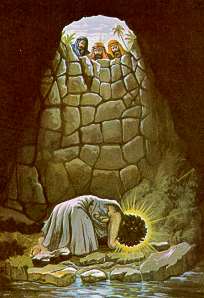Background Passages: Matthew 14:22-36; Mark 6:45-52; John 6:15-21
As I write today from the safety of my home in Pasadena, Texas, Hurricane Harvey slammed into the central Texas coast as a Category 4 storm. Our prayers go out to those most impacted by the storm. Here, the heavy rains began to fall last night and continue off and on this morning.
I’m reminded of friends who have children serving in the United States Coast Guard. Their search and rescue teams prepare themselves for moments like this. As the storm rages, there is all too often a boat unable to outrun the storm, putting lives of those aboard in jeopardy.
I’m amazed at the men and women who fly out in helicopters or battle the breaking waves in Coast Guard vessels to put their lives on the line for those trapped in the storm. I can’t begin to imagine the bravery required to drop into those rough waters to rescue a stranger in despair. Those heroes will tell you that their work is less a matter of bravery as it is focus and training.
The Bible tells us a story of a raging storm that threatened a small boat and its crew of 12 men. I heard it first as a child and it remains one of my favorite Bible stories today. It happened at a time when there was no Coast Guard to offer assistance. The full account of the dramatic event can be found in three of the four gospels.
Hours before this story actually began, Jesus fed more than five thousand people with a prayer and a small basket of bread and fish. The crowd saw his miracles, but missed the meaning of his message. John tells us they wanted to make him king on the spot. Jesus considered such talk a distraction and determined to avoid the temptation to abandon his Father’s purpose. Dismissing the multitude, Jesus sent his disciples across the Sea of Galilee while he went up on the mountain to get away from the distraction and pray. To focus again on what God called him to do.
That night as the disciples headed toward Capernaum on the northwest shore of the sea, a strong wind blew, turning the placid water into an untamed tempest. For hours the 12 disciples fought the storm, water-soaked and weary. They made little headway. Still miles from the safety of the shore, battered by wave and water, tired to the bone, a ghostly apparition approached their vessel. The disciples cried out in terror, certain the figure was an omen of doom.
Above the roar of the storm, they heard a voice, “Take courage! It is I. Do not fear.”
Peter, recognizing the voice of Jesus, asked his master’s permission to join him on the water. Jesus called out to him, “Come.” I cannot imagine the thoughts running through his head as he threw himself overboard into the teeth of the storm. With a hand on the wale of the boat, Peter leaped into the roiling sea at the invitation of Jesus and began to walk on the waves.
Peter sloshed through the waves toward Jesus. Waves crashed around his ankles with every step. The warning cries of his friends turned into stunned silence as Peter walked determinedly through the storm. In one devastating moment, a breaking wave splashed across his face or a flash of lightning and a cascade of thunder drew his attention to the storm swirling around him. Peter took his eyes off his Lord. As he sank into the sea, sputtering in fear as each wave crashed over his head, Peter called out for Jesus to save him.
Matthew says that no sooner had Peter voiced his plea, Jesus stretched out his hand, raising Peter once again to the surface of the waves. Peter clung to Jesus’ arm. He coughed and sputtered, spewing salty seawater from his lungs. Jesus’ words as he lifted Peter into the safety of his arms seemed to condemn the disciple. “You of little faith.” A reprimand. A put down.
According to one commentary, those four little words that seem to convey disappointment in English, are rendered in two words in the original Greek. “Little Faith.” Almost a term of endearment. A lighthearted teasing among great friends. “Why do you doubt?”
Then, Peter, arm and arm with Christ, walked again on water as Jesus took him back to the boat…while the waves continued to crash and the wind continued to blow. It wasn’t until they climbed back aboard that the storm ceased.
This wonderful story reminds me of three things.
Think about it. At that stormy moment when Jesus said, “Come,” the water, to Peter, seemed a safer place to be than the boat. With his eyes locked on Jesus, the wind and waves were less daunting. In fact, with his eyes on Jesus, Peter no longer noticed the storm raging around him.
As Peter jumped from the boat and began walking toward Jesus, the storm kept blowing. The tempest didn’t stop when his feet touched the sea. Rather, Peter quit looking at the obvious and turned his eyes on Jesus. For those few seconds, his faith blocked out the howling wind and the crashing waves.
Following Christ requires a measure of courage. A leap of faith if you will. Heller Keller said, “Life is either a daring adventure, or it is nothing at all.” Born without sight, hearing or speech, Keller overcame every obstacle to inspire millions to live a courageous life.
Peter, like the rest of the disciple band, feared for his life in the worst of the storm. Yet, when his eyes locked on Jesus and he heard his call to “Come,” Peter’s fear evaporated and he threw himself upon the waves without hesitation, another step in a daring adventure. The rest of the disciples continued to cling to the boat under a cloud of dread and despair. Peter’s first step was a courageous act of faith.
Life is a risky endeavor. God calls us to act on faith. Taking steps into the dark waters. Not settling for less. Not accepting the status quo. When we hear the spirit’s call to “Come,” we must jump out of the boat. If God calls, the boat is no longer the safest place for us to be. Those of us who are unwilling to take risks, will never discover the exhilaration of walking on water…of discovering what living in faith is all about. We will never have all the answers before we make our decisions. Faith remains a mystery if we wait until we have all the answers. There is power for us in that first lesson.
There is more this story can teach us.
Whether the water splashed against his cheek or the wind picked up its intensity, Peter lost his focus. When he looked away from Jesus and into the teeth of the storm, he lost his courage. He feared for his life. He sank into the sea. How easy it is to become distracted, especially when the storm around us is raging. Our concentration on Christ breaks. We focus instead on the problems we face.
Life is filled with turmoil. Issues that distract us from that which God wants us to do. In those times, our natural impulse is to allow our fear to trump our faith. We must resist those distractions. If the Coast Guardsman focused on the strength of the waves, he might never jump into the water.
Jesus and Peter provide two ways of dealing with distractions. When, the multitude wished to make Jesus their king, Jesus sent them away. He removed himself from that which might distract him and went up to the mountain to pray. There are certainly times when we can leave the distraction behind and spend time in prayer to the Father.
Like Peter, however, there are times when the distractions press so hard on our hearts that we begin to falter in our faith. The problems are beyond our control and tend to overwhelm our senses. Peter made it through the storm as long as he kept his eyes on Jesus. When the storm intruded into the peace in his heart, Peter lost it. Lost his focus. Lost his connection to Christ. As hard as it may be at times, we must always keep our eyes on our Lord, especially when we’re in the middle of one of life’s many storms.
There is one final message that shines like a beacon in the stormy night. When Peter found himself treading water, he called to Jesus for rescue. In his deepest fear, he knew to whom he must call. With an outstretched arm, Jesus lifted Peter from the water and…here’s a point we often miss…Peter and Jesus walked together, back through the storm, and climbed into the boat. It was only then, that the winds stopped blowing and the waves stopped crashing.
Faith does not dissipate the storm. Just because our fear grips us as the ill wind blows, Jesus does not take the storm away or remove us from its impact. Rather, he lifts us from our deepest despair and walks with us through the waves that would engulf us.
Christ does not abandon his followers to the storm. When needed, he reaches out for us. Challenging us rather than chiding us, he calls us, “Little Faith.” He probes our hearts, “Why do you doubt?” And, to prove his point, he walks with us on top of the water until the winds no longer blow.
So, here are the questions I must ask myself.
When he says to me, “Come,” will I jump from the boat? Will I walk on water?
As I live my life of faith, will I keep my eyes on Jesus or will I let the storms that come distract me from the life he has called me to lead?
When I falter, and I will falter, will I call upon his name and allow him to walk with me through the storm, or will I sink into a new wave of despair, struggling to keep my head afloat?
Those are good questions for all of us. Upon what are you focused today? The storm or the savior?








